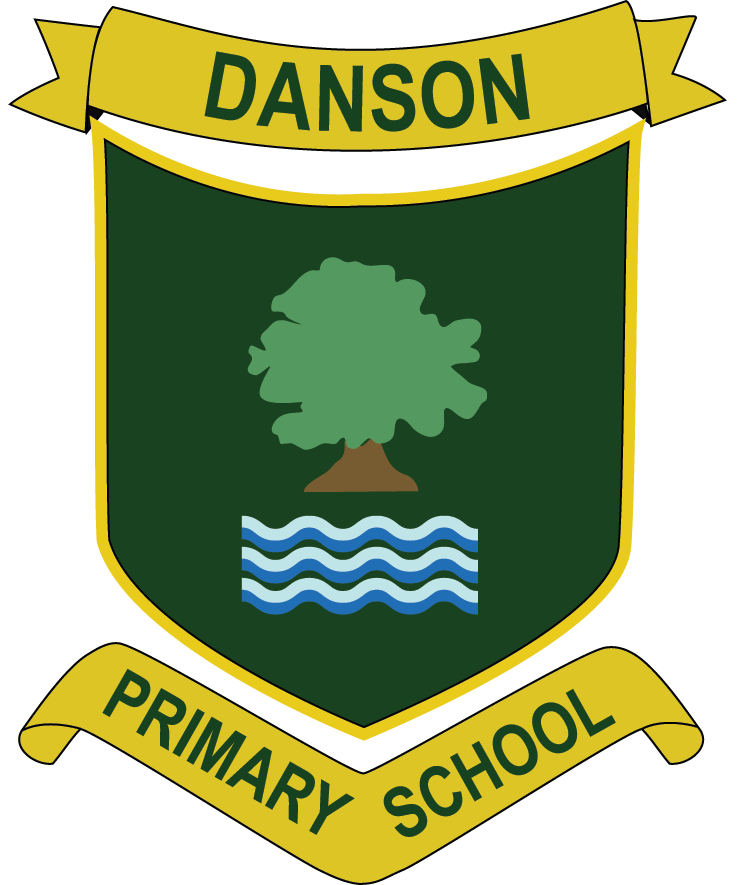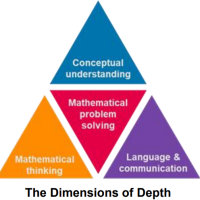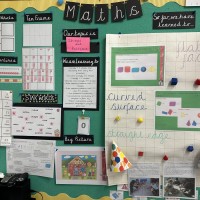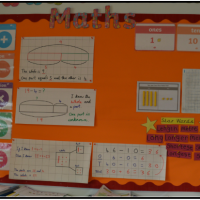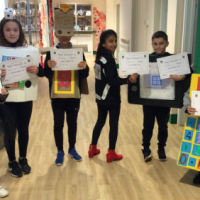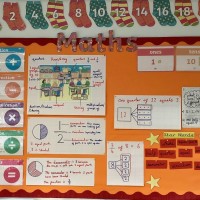Mathematics
At Danson Primary School, we believe that mathematical success is possible for all. As a school, maths lessons will include the use of concrete materials, pictorial representations, varied fluency, reasoning and problem solving to ensure that children are able to master the curriculum and approach abstract concepts with confidence. This process enables children to think mathematically, using their language and communication skills, so that they can independently apply their learning to a new problem in an unfamiliar situation. From EYFS through to Year 4 we follow the Mathematics Mastery programme for teaching and learning and, in Year 5 and 6, we follow the White Rose Maths planning scheme.
Danson children are inspired to be passionate about maths and to think critically when working in a mathematical manner. They are taught to deepen their thinking through their approach to tackling challenging problems and investigating possible outcomes. Children are posed with a series of questions to increase their knowledge and understanding of specific objectives and then they are encouraged to create their own questions to make connections between different mathematical concepts and topics.
The National Curriculum for Mathematics:
The National Curriculum sets out what children need to cover throughtout their time in Primary School. Teachers link their planning to the national curriculum and understand how these support children to make progress in learning. The national curriculum for mathematics says:
- Become fluent in the fundamentals of mathematics, including through varied and frequent practice with increasingly complex problems over time, so that pupils develop conceptual understanding and the ability to recall and apply knowledge rapidly and accurately.
- Reason mathematically by following a line of enquiry, conjecturing relationships and generalisations, and developing an argument, justification or proof using mathematical language.
- Can solve problems by applying their mathematics to a variety of routine and non-routine problems with increasing sophistication, including breaking down problems into a series of simpler steps and persevering in seeking solutions.
In our curriculum we meet the National Curriculum expectations and provide rich and exciting opportunities within Mathematics. The children are taught a vareity of key concepts across the core strands of maths.
Reasoning Skills
Developing opportunities and ensuring progression in the development of reasoning skills.
The aims of the National Curriculum are to develop fluency and the ability to reason mathematically and solve problems. Reasoning is not only important in its own right but impacts on the other two aims. Reasoning about what is already known in order to work out what is unknown will improve fluency; for example if I know what 12 × 12 is, I can apply reasoning to work out 12 × 13. The ability to reason also supports the application of mathematics and an ability to solve problems set in unfamiliar contexts. Please see the the link below which gives examples of what mathematical reasoning looks like in different year groups within the different areas of maths.
National Centre of Excellence in the Teaching of Mathematics

Teaching Mathematics at Danson
As a school, maths lessons include the use of concrete materials, pictorial representations, varied fluency, reasoning and problem solving to ensure that children are able to master the curriculum and approach abstract concepts with confidence. This process enables children to think mathematically, using their language and communication skills, so that they can independently apply their learning to a new problem in an unfamiliar situation. We call this the ‘Dimensions of Depth’.
From EYFS to year 4, we follow the Mathematics Mastery programme for teaching and learning and, in year 5 and 6, we follow the White Rose Maths planning scheme. Both of these schemes provide a range of opportunities for children to apply their mathematical thinking skills. Teachers use this to help plan exciting and challenging opportunities that involve mathematical talk and application of key concepts.
Throughout the week, we provide children with a broad and balanced range of opportunities for maths learning to take place both in and outside the maths lesson. This include but are not limited to:
- Daily maths lessons
- Daily counting
- Quick recall of known facts
- Low stakes retrieval quizzes
- Investigations
- Outdoor learning
- Arithmetic fluency practise
- Mental maths quizzes
- Number games
- Data collection and statistical analysis
- Scientific graph drawing
- Storytelling in maths
- Problem solving
- Reasoning and vocabulary applications
Vocabulary
Children at Danson focus on vocabulary in every maths lesson and in relation to all maths tasks. The correct terminology is modelled for children and it is discussed in context and related to real life situations. ‘Star words’ are used at the start of, and within, all lessons for children to practise using crucial vocabulary. Children will have many opportunities to discuss maths language with their peers and ‘talk as thought’ dialogue is promoted in all lessons. Children are supported with sentence stems, word banks, visual displays and additional resources when appropriate. Parents are provided with a list of key maths vocabulary when children enter a new year group.
Times Tables
By the end of Year 4, all children should have a quick and accurate recall of all multiplication facts up to 12 X 12. This vital knowledge supports children in other areas of mathematics, such as fractions and division. Also, children in Upper Key Stage 2 must have a secure grounding of times table facts to successfully solve problems. For depth of learning, we believe it is important that children are given the opportunity to see, explore, and understand the mathematical structures, patterns and relationships within the times tables.
Online Resources to Support the Teaching of Mathematics:
At Danson, we believe that technology plays an important part in our society and it should be reflected in our practice of teaching and learning. We use a variety of technology software and hardware to inspire children and enhance the teaching of mathematics.
NumBots
This software is aimed at pupils in EYFS and Key Stage One who are practising crucial place value and arithmetic skills. NumBots supports every child in achieving the understanding, recall and fluency in mental addition and subtraction, so that they move from counting to calculating. Pupils choose their own avatar of a ‘Bot’ before launching into ‘Story’ and ‘Challenge’ modes, where pupils can practise different addition and subtraction methods and calculations. As they progress, pupils collect achievement badges and unlock hundreds of new levels and challenges. In the Story Mode, they will also discover parts, helping RustyBot upgrade from Rust to Diamond - so he can shine inside and out. Tables and charts enable teachers to keep track of progress and usage at a class and individual level.
Times Tables Rock Stars (TTRS)
We use Times Tables Rock Stars as a resource to support children in improving their accuracy and speed when recalling multiplication facts. Times Tables Rock Stars is a fun and challenging programme designed to help students master their times tables. It is accessible at home and school and children earn coins for correctly answering questions. Each child creates their own rockstar avatar and, by playing in different game modes (such as ‘Garage’, ‘Gig’, ‘Rockslam’, ‘Arena’ and ‘Stadium’), earns coins to buy special items to modify their avatar. The platform is safe for children to use and encourages a competitive element when ‘battles’ are arranged between groups. ‘Battles’ are low-stakes competitions that can be against classes, year groups, teachers, other local schools or even against other classes and schools in the country as part of national battles. Furthermore, children are able to practise specific times tables that they need to consolidate as the programme makes use of a meticulous automatic training mode which tracks children’s success and gaps in knowledge to set times tables questions.
Pupil Voice - Times Table Rockstars
“I enjoy playing Times Table Rock Stars because it is fun and competitive when I play against my friends and people around the world.”
“I like that when I’m using Times Table Rock Stars I can solve multiplication and division equations.”
“Times Table Rock Stars is fun while learning the times tables that I don’t know.”
Danson Primary School Maths Week 2024
Danson Primary School enjoyed an exciting Maths Week with a range of activities in lessons and beyond. Each day had a different focus to inspire and interest the children in a variety of areas of maths:
On Monday, the Key Stage One children learnt about money, what the different coins represented and how much they are worth. This supported them to buy different items from the shops. The children used this knowledge to help them calculate change, which they did using the part whole method.
Our Key Stage Two used this knowledge to calculate what coins they would need and a variety of word problems with larger amounts of money. This supported them in calculating change and combining amounts. It also helped them to work out how much profit they made and how to cover their costs.
On Tuesday, we introduced various Sentence Stems to support the children to speak in full sentences and articulate their reasons. This included - ‘If I know, then I know’ and ‘I think that…… because’. It was fantastic to see and hear some all of the children use these in their lessons throughout the school. Year 1 children were amazed that they could select one 50p coin rather than fifty 1p coins and explained - “I know this because 50 1ps are the same amount. I thought I would have to have all the 1ps”.
We had ‘What’s the time Wednesday’, where children looked at both analogue and digital clocks to tell the time. Few children see analogue time these days as we live in a digital world, so this can be a rather abstract concept. The classes focused on reading and writing the time. This included learning o’clock and to half past in Year 1, quarter past and quarter to in Year 2 and moving on to reading to 1 minute in Year 3. Upper Key Stage 2 recapped reading the time and also applied this to time problems.
Thursday was our ‘Throwback Thursday’ event. This is when the teachers looked back at a previous element of maths to recap and support children in making connections to future learning. Classes look at a variety of topics such as previous timetables in Year 4 and fractions in Year 5 and Year 6.
An important part of our curriculum at Danson is learning about money and we are proud members of the Centre of Excellence in Financial Education. Friday was Financial Friday. The children had an exciting time discussing their outfits as many dressed up in what they wanted to be when they are older. They also discussed the impact of the financial difficulties in the world. Each year group continued to learn about the subject of money which included topics such as the value of money, different ways to pay, exchange rates and money in other countries.
What did our teachers say?
Our teachers planned the events into their timetable. Here is what they said about Maths Week:
“In Maths Week, I liked seeing the children’s enthusiasm for the maths shop and the two visitors we had on Friday - I would have happily listened to them for longer!”
“I have enjoyed seeing the children excited about Maths and how they are using their skills learnt in Maths lessons in the outside world.”
Dress up Day
On Friday was our dress up day for the whole school. The children dressed up as what they wanted to be when they were older or something maths related. There were several award winners as you can see from below, congratulations to you all - there were some excellent outfits.
The Shop!
We brought maths into a real-life context through hosting classroom shops. Children experienced the important life skills of exchanging money, working out the correct coins and calculating change.
EYFS and KS1
In EYFS and KS1, children took part in a ‘Bring and Buy Sale’ to raise money for school funds and important maths resources. Pupils kindly brought in donations that were age-appropriate and inspired purchases to be made. Children priced their items and were supported in buying things from the sale and acting as ‘shopkeepers’. The pupils explained what they thought as well:
“I think the shop was good because if you had more money, you could get change and buy more things.” Jack, Year 1.
“I thought the shop would be smaller, but I was surprised. One of the things I got was a diary. I wanted chocolate, but I did not have enough money as it was 50p and I only had 10p.” Veda, Year 2.
“I bought an aeroplane that cost me £3. I had £5 and then I bought some chocolate which was 50p and with my last £1 I bought a book. I liked the shop because it was massive.” Shye, Year 2.
KS2
In KS2, children took part in the ‘£20 Shop Challenge’. Each class was given £20 to spend on items with the challenge to sell all their items and make the most profit for their class. Children priced their items and were responsible for selling and buying things from the sale.
Our children enjoyed the shop:
“We’ve really enjoyed making lots of money in the shop and getting Mr Welsh to buy things.” Year 3 pupil
“I have loved exploring the shop and seeing all the different things that I can buy. I have loved being the shop keeper and working out how much money people owe me and how much change I need to give them.” Dara, Year 4
“I loved looking at and trying to work out how much profit my class have made. I want us to make the most. I have used my knowledge of estimating to guess how much money in the shop.” Ashviga, Year 5
Our teachers enjoyed the shop, here is what they said:
“The children have been able to make decisions about their money and work out their change.”
“They have loved using their own money to buy things and work out how much change they have/need.”
“The shop allowed the children to think about pricing of items to make a profit. We looked at splitting multipack items to make the best profits. It allowed the children to experience buying and selling and giving correct change which, they needed to do mentally. It has fostered an enjoyment towards maths from all of the children even those who normally do not like the subject.”
The shops across the school were highly competitive and as you can see, everyone enjoyed it. The winner of most money raised in KS1 was Year 2 with £141.53. The winner of the ‘£20 Shop Challenge’ in KS2 was Henry with £254.82.
Overall, we raised an astounding £2350.77. during the week - thank you so much for your support.
Maths Volunteers
As part of Maths Week, we welcomed in volunteers. Each one spoke to the children about their jobs and how they use maths beyond the classroom. It was great to see how they had thought about how to communicate this to the children and we are all extremely grateful to them for sharing this with us.
Our first volunteer was Mr Andrew Carey. He is an accountant and spoke to our Year 3 children about his role. He explained how ‘count’ is in his job title, so this is a role where maths sits. Mr Carey explained all about being an accountant and the variety of elements of maths he uses in his role. The children really enjoyed listening to Mr Carey and had many questions to ask him at the end of the session.
“I liked how he had a used a calculator to help him add. As an accountant he went to university and he was intelligent.” Arthur, Year 3.
“I enjoyed learning about all of the different parts of his job and how his job had changed since he started working in the early 1990s.” - Hayden Year 3.
Our second volunteer was Mr Mark Ward who spoke to our KS2 children during two assemblies. Mr Ward discussed his job as a Compliance Officer for an organisation that volunteers in schools, how he uses maths in his work and throughout his whole life. Mr Ward even explained how he has used it to travel to Danson. We were impressed with how much Maths he uses every day and the children managed to share plenty of their examples too.
Our third volunteer was Mr Paul Brazier who is a Managing Quantity Surveyor, he spoke to our Year 4 children. His role is to control the money on building sites by calculating the size of a property to know how many bricks are needed to build it. He explained that he has to work out the cost of every element of building a house or block of flats to know what the total cost will be. The children were fascinated by Mr Brazier’s job and they asked lots of questions about the types of jobs he has completed. They couldn’t believe that one project he is working on will take another 57 years to complete!
Our final volunteers spoke to our Year 5 and 6 children. Mr Clive Fathers spoke to the children about his role as a tax advisor. He explained the reasons for tax and why that is important. Mr Fathers then showed the children how to make money with a practical example and how this linked to profit. The children worked out how much tax they received from this profit. It was a great way to help the children understand something can be quite complicated.
The second part of the assembly was with Mrs Justine Zogaj who works in the Foreign Exchange. Mrs Zogaj explained the role of what a platform specialist is and how maths supports this. The children were interested in how a business can be available all the time as when one country is asleep, the other is awake. Mrs Zogaj then went on to talk about how the value of the Yen compared to the Pound and how this changed over time. Mrs Zogaj gave a practical element of buying a jumper and demonstrated how the money is exchanged from when you order an item, to it arriving at your door.
Maths Week was a huge success and we would like to say a massive thank you to all the volunteers who shared such amazing examples of how they use maths in their jobs and taking the time out of their bust schedules to meet with our children. You have greatly inspired our next generation of mathematicians!
Thank you to our Maths Team Miss Tuffley and Mr Ewen for helping to organise such a wonderful week and to the teachers for creating some wonderful learning tasks for the children to do throughout the week. We would also like to say thank you to the Danson School Community for providing items for the shop, buying and selling all the items and participating in the week.
Maths 24 Club
Each year, pupils from Year 5 and 6 can take part in Maths 24 Club. This is where children play a card game that has 4 numbers on it 0-9. Children have to make the total 24, using all the numbers, in the quickest way possible. They battle in a team of three and improve their fluency and arithmetic skills along the way! Danson always takes part in the annual 24 Bexley Competition, with other schools from the borough, and in the last three years we have had team winners and individual winners in every single competition! 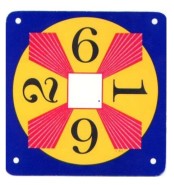
Junior Maths Challenge
Each year, Year 6 pupils take part in the UK Maths Trust’s Junior Maths Challenge. This is a digital 60 minute quiz which encourages mathematical reasoning, precision of thought and fluency. Here is an example of a tricky question from the challenge and a method to solve it:
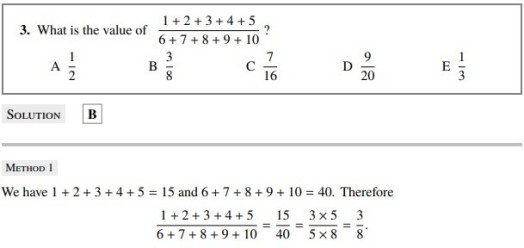
Maths Homework and Supporting Your Child At Home
The role of parents does not just mean supporting. It is vital that parents show a positive attitude towards mathematics and share the need for it in real life with their children. It is commonplace in the UK to hear adults say, ‘I can’t do maths’ but it is much less common to hear adults say, ‘I can’t do reading/ writing’. Negative mindsets towards maths can become a barrier to learning for pupils and parents/carers should aim to enthuse their children about the subject.
The maths curriculum has greatly changed over the last two decades and Danson supports parents with this through workshops, information on the school website, homework letters and suggested digital and non-digital resources to use at home. Parents and carers can positively impact their child’s mathematical understanding by engaging with the suggested materials from school and discussing maths with their child.
Parents/carers should:
- Talk positively to their children about their maths learning on a regular basis
- Engage with homework and newsletters to see what topics are being taught
- Ensure regular rapid recall of key facts are practised at home (e.g. times tables or number bonds)
- Ensure regular real life maths is drawn attention to (e.g. telling the time on an analogue clock, paying with coins and notes or measuring ingredients while cooking)
- Encourage the practice of new and alternative written methods
- Support the completion of MyMaths weekly homework and termly topic homework.
Mathematics Homework
At Danson, we set mathematics homework as part of the topic grid and a weekly task.
The weekly task is provided via the Online portal of Mymaths. This portal provides tasks for the children to complete that are linked to their current learning and consolidate what has been covered in class. It provides an opportunity to recap learning via a video and there is an option to add sound buttons and a colour overlay. Teachers set this weekly and monitor whether the children are completing it.
On the topic grids, there is a maths problem that is linked to the different areas of the curriculum. It is a problem solving and investigation style question and children are encouraged to complete this independently.
Children are also given the opportunity to practise number bonds and times tables through our online platforms of Numbots and Timestables Rock Stars. Teachers encourage the children to participate online and they are certificated for the children who are practising at home.
Websites
Websites to support children’s learning in maths are many and varied. Some recommended sites are listed below.
